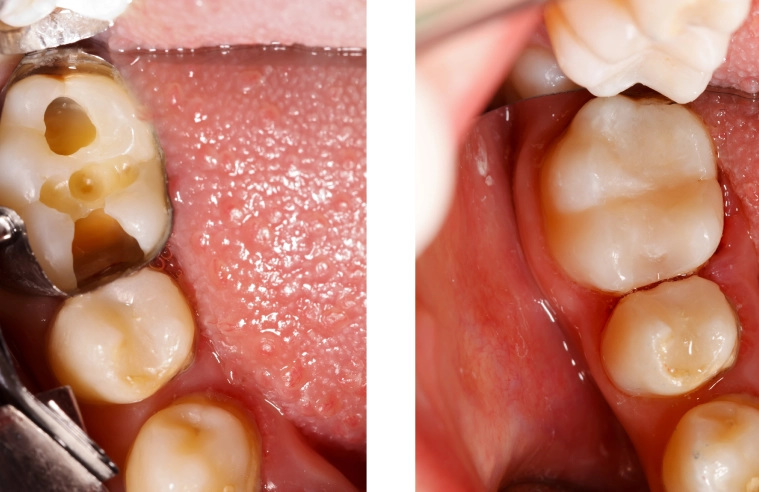Does getting a crown hurt? Many people wonder about the discomfort involved in the process. Understanding what to expect can remove concerns and help you prepare for your dental appointment. In this blog, we’ll explore the common questions and concerns surrounding the experience of getting a crown, including pain management techniques and what to expect during the procedure.
Let’s delve into what a dental crown is. Does it hurt to get a crown? And how you can ensure a comfortable dental experience.
What is a Dental Crown?
A dental crown is a prosthetic covering placed over a damaged or weakened tooth. It restores the tooth’s shape, size, strength, and appearance. Dental crowns are commonly used to protect a tooth that has undergone extensive decay, has a large filling, or has been weakened due to root canal treatment. A crown can cover a dental implant or hold a dental bridge. They are made from porcelain, ceramic, metal alloys, or a combination of these materials. It is custom-made to match the color, size, and shape of the patient’s natural teeth for a seamless and aesthetically pleasing result.
What is the Need for a Dental Crown?
A crown is needed for various reasons:
- Restoring a broken or worn-down tooth
- Protecting a weak tooth from further damage
- or holding together the parts of a cracked tooth
- Making cosmetic modifications to improve the appearance of a tooth
- Covering a dental implant
- Concealing discolored or misshapen teeth
- Securing a dental bridge in place
- Providing support to a tooth with a large filling when there’s not much tooth structure left
While adults are the primary candidates for dental crowns, children may also benefit from the procedure. Children might need dental crowns to preserve a primary tooth damaged by decay that cannot support a filling. Additionally, crowns can safeguard children’s teeth at higher risk of tooth decay.
What is the Dental Crown Procedure Like?
The dental crown process takes place in two stages:
First, the dentist examines and prepares the tooth for the crown. Then, after about two to three weeks, the permanent crown is ready to be placed.
Now, the big question: Does getting a crown hurt? The simple answer is no. Before starting either part of the procedure, the dentist numbs the tooth and surrounding gum tissue. After the crown is placed and the numbing wears off, discomfort or sensitivity might occur. If the pain continues, it could mean the crown is too high on the tooth. The patient should contact their dentist to schedule an adjustment in that case.
Does Getting a Crown Hurt?
Let’s explore the discomfort related to dental crown procedures.
Discomfort
While dental crown placement isn’t extremely painful, some discomfort may arise afterward, which is normal. During the procedure, dental drilling is used to remove infected areas of the teeth. This drilling may cause discomfort but indicates that the infected parts have been removed, exposing the tooth roots. The dental crown is then placed over the exposed area to seal off the tooth and stop the infection.
Although patients are usually numbed during the procedure, they may experience tenderness and soreness afterward. Most general dentists advise taking over-the-counter pain medications a day or so after the procedure to alleviate discomfort.
Gum Soreness
Gum soreness is a common occurrence after a dental crown procedure. The placement of the crown on the tooth can irritate the gum line, leading to inflammation and swelling. Patients can use ice packs, cold compresses, and over-the-counter pain medications to alleviate soreness. Typically, any discomfort along the gum line should subside within a day.
Expectation
First, the dentist will have a custom-made crown ready for you. After removing decayed areas with drilling, the tooth will be cleaned and readied for crown placement. Dental cement will be applied to ensure the crown remains secure. The dentist will then position the crown and make any required adjustments to ensure proper shaping, size, and smoothness around the edges.
Conclusion
General dentists commonly perform dental crowns, crucial for improving oral health. Many patients opt for crowns to restore or replace damaged teeth.
If you’re considering getting a dental crown, ensure a smooth experience by choosing the right dental provider. Contact Mount Zion Dental Services in North Miami Beach, FL, to schedule an appointment. New patients can call us at (786) 565-5913, and current patients can reach us at (305) 330-9330.
FAQ
Does getting a crown hurt during the procedure?
The procedure itself is typically painless. Dentists provide local anesthesia to numb the tooth and nearby area, ensuring minimal discomfort during crown placement.
What can I expect after getting a dental crown?
A: After the anesthesia wears off, you may experience some sensitivity or discomfort, which is normal. Over-the-counter pain medications can help manage any post-procedure discomfort.
Is there pain involved in preparing the tooth for a crown?
The tooth preparation process may cause slight discomfort, but local anesthesia is administered to minimize pain. Dentists take care to make the experience as comfortable as possible.


